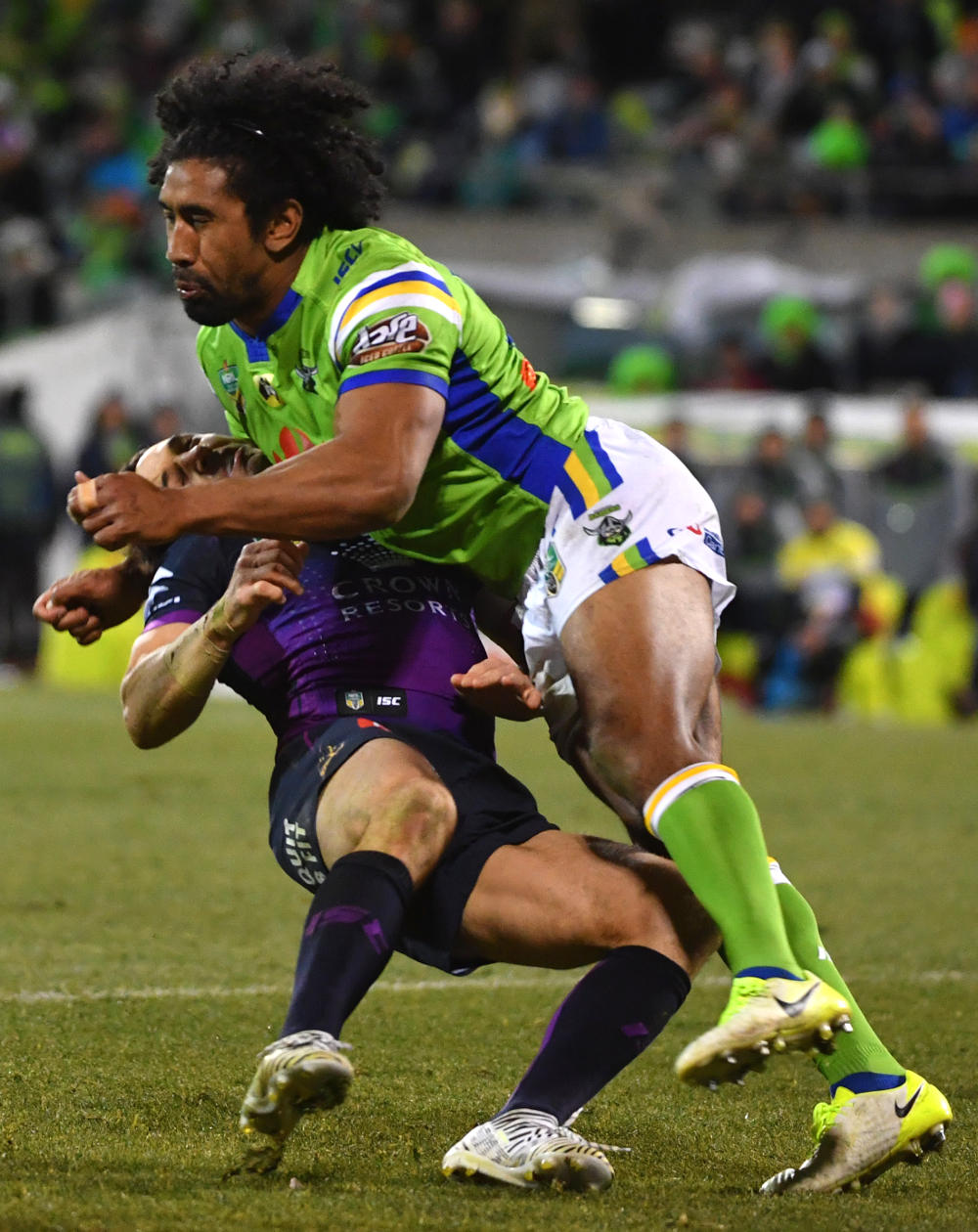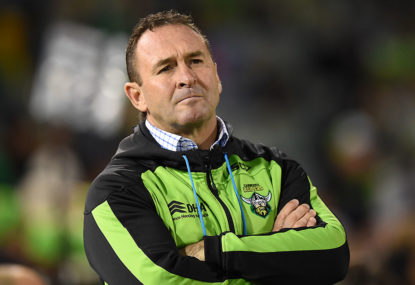There’s nothing more boring and predictable in rugby league than a coach deciding to blame the referees at a presser for their team’s loss.
We’ve seen this twice in the last two weeks – last week Ricky Stuart decided it was appropriate to blast the referees after the Canberra Raiders lost to the Melbourne Storm and this week Paul McGregor did the same after the St George Illawarra Dragons lost to the Newcastle Knights.
Let’s start with the game last weekend.
The Storm beat the Raiders 20-14. In the post-match press conference, rugby league fans were treated to a five-minute speech from Stuart on why referees need to be held more accountable. According to Stuart, he received ’47 texans’ (read texts) from people after the game commenting on how hard done by his team was.
The key for Stuart is accountability – apparently as a coach he has to sit in press conferences ‘every friggin’ week and answer questions’. His players are held accountable by the media, the fans and coaching staff. But for Stuart, the one group that is not held accountable enough are our referees.
I don’t have a problem with coaches making suggestions about how the game should be administered. Open dialogue is important. A game that does not take ideas and suggestions from key stakeholders is one that will not move forward. But I do have a problem with the way Stuart decided to conduct himself. Not because it was offensive or inappropriate – but just because it felt to me like he was passing-the-buck. It felt like a cop-out.
Interestingly, Stuart also blew up about how his team were treated by the referees, but there was no mention of the controversial incident in that game which very much worked in his team’s favour.
While Stuart was cranky about the decision to let the Storm play on after Suliasi Vunivalu picked up a Raiders’ play-the-ball following a Melbourne infringement to score, that was a decision that was eventually overturned by the bunker. A decision that wasn’t overturned though was the decision to let Sia Soliola stay on the field after he had almost taken Billy Slater’s head off with a high tackle.

(AAP Image/Mick Tsikas)
I often find that in rugby league, much like in life, sometimes the call goes your way and other time it doesn’t. I like to believe that in the end, it all evens up.
The reality is, Canberra were well and truly in this game, but they failed to convert their opportunities. They had 50 per cent of possession, had 11 offloads and made four line breaks. Conversely, they also had a 68 per cent completion rate, missed 30 tackles and made 13 errors.
Even without Billy Slater and Cameron Smith on the field, Canberra were not good enough to win.
Instead of going on a five-minute tirade about the referee’s, Stuart should have recognised that and owned it.
You know who else wasn’t good enough to win? The Dragons against the Knights on Saturday.
Let’s put this into perspective. The Dragons are a team that have absolutely surprised everyone this year, particularly after the way they started the season with six wins from their first seven games.
It has gone downhill in recent weeks and this fall from grace culminated in a loss against the bottom-placed Knights on Saturday. With this loss their finals hopes are in serious danger.
But instead of focusing on the Dragons sub-par performance, McGregor chose to focus on the calls that went against his team.
Granted, I see this game as slightly different to the game between the Storm and the Raiders because there were two controversial decisions made in the first half. The first was a ‘no try’ decision for Tim Lafai because Jason Nightingale was ruled to have knocked on while contesting a bomb (despite the fact that he was falling backwards). The second decision happened only a couple of minutes later. Nene Macdonald was called back after Trent Hodkinson dived on the ball in the lead-up to Macdonald’s 90-metre dash. This dive from Hodkinson was ruled as interference.
In his press conference, McGregor called the effort by the referee’s ‘embarrassing and incompetent’.
I wouldn’t go so far as to label the Dragons performance ‘embarrassing and incompetent’ but the facts are this. The Dragons had 50 per cent possession but only managed to complete 62 per cent of their sets. Despite having seven line breaks and 17 offloads, the Dragons also made 15 errors and managed to only score 14 points against a team that has only won three games in the last two years.
With all that in mind, it looks to me like refereeing is being used as an excuse.
There have been some suggestions that coaches are now blaming referees as a tactic. After Stuart’s five minute speech, there was very little time to question him about his team’s performance or about the Soliola incident. Likewise, McGregor on Sunday. If that’s the tactic, then it certainly worked to deflect attention from the poor games that each of these two teams have had in recent weeks.
While Stuart may not think that referees are held to account enough, I also think that as fans we often forget how challenging a job refereeing is. According to Todd Greenberg, a head referee, on average, makes 400 crucial decisions in 80 minutes. In all, 40 of these decisions are fifty-fifty decisions and could go either way.
On average a referee makes eight errors per game – which seems insignificant. The problem of course, is that not all errors are created equally.
Being a coach is one of the toughest jobs in footy. When the team wins it’s ‘full credit to the boys’, but when the team loses, the coach is the first one to be called out and held responsible.
But surely, coaches can be more gracious in press conferences and accept when their teams are beaten by the better team – as was the case in both these games.






























































































